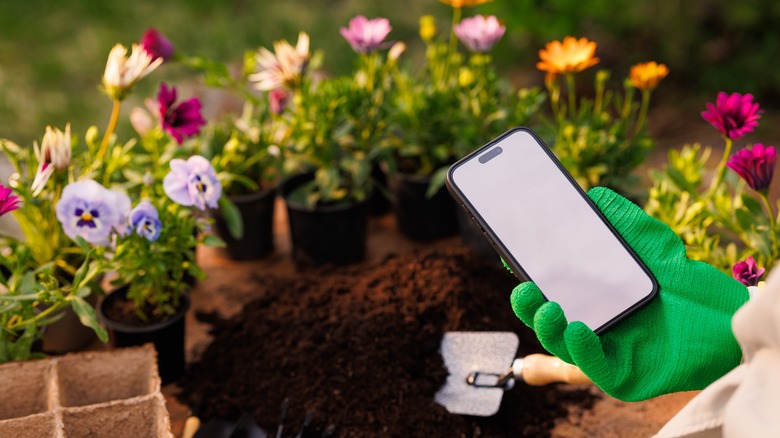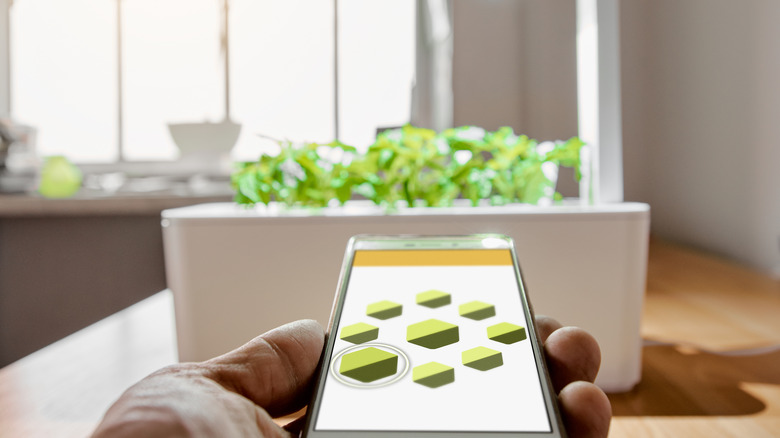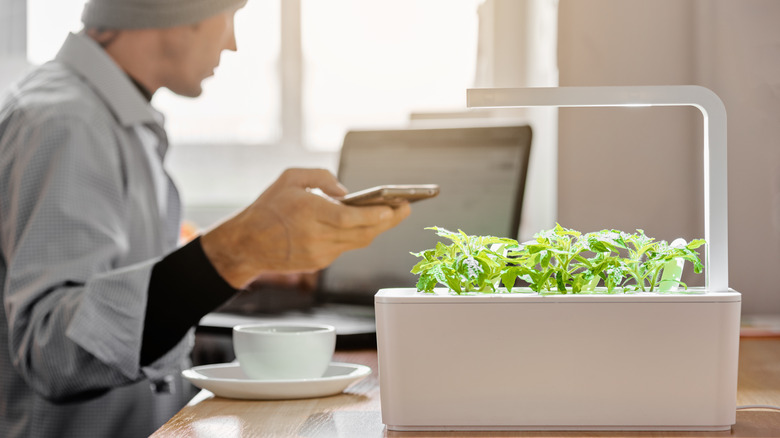Smart Flower Pots Are The Houseplant Essential You Wish You Had Sooner
Not everyone who enjoys some greenery in their home has an instant green thumb, and even those who are in tune with their houseplants' needs are likely to admit that it can be pretty time-consuming to keep up with your plants and anticipate precisely how much water and light they require and when they require it. That doesn't even factor in fertilization, temperature regulation, repotting, and other tasks that keep your houseplants healthy. Smart flower pots are a newer phenomenon that helps plant owners easily distinguish what their plants need. In some cases, they even give our houseplants the ability to tend to those needs without our interference.
Although many different variations of smart pots are on the market, at their core, they are pots that help indicate what our plants need so that they can be taken care of in a timely and healthy manner. Smart pots utilize technology, incorporating sensors and other components into the container, often connecting to an app to establish when things like watering, light adjustment, and fertilizing are most suitable. Some smart pots can release water and fertilizer and adjust lighting and temperature on their own, while others will simply alert you to these needs so you can perform those tasks yourself. Regardless of which kinds of smart pots and technological amenities you explore for your plants, you'll be asking yourself why you had not integrated these into your home sooner.
Variations of smart pots
The vast array of features available for smart pots can be overwhelming. However, many try to make it as easy as possible, using sensors that typically pair with an app to help monitor your plants. The SeaCal Smart Pot is a prime example of how horticultural specialists use modern technological advancements to benefit plant life. This university-funded smart pot offers 24/7 monitoring on numerous things, from soil moisture and air humidity to lighting and temperature updates, to give you plant health reports. Similarly, you'll find other brands like Grey Technologies and Decorling with their take on smart hydroponics. Grey Technologies' understated design leaves the onlooker not immediately knowing that this is a smart pot. But this chargeable pot has an embedded microchip and sensors that track the plant's metabolic process and activity to determine its needs and encourage you to take more efficient action in your plant's care.
While some smart pots will alert you to the needs of your plants so that you can perform those care tasks promptly, others will actually be able to manage that upkeep for you. Decorling's Smart Pot is a sleek container that can hold multiple plants at a time and has properties that automatically water and fertilize, regulate temps, and provide different types of grow light options. All you have to remember is to add fertilizer and water to the appropriate compartments, and the pot will take care of the rest.
Which smart pot is best for you?
As you choose which smart pot or pots to invest in, consider several factors, including what you want to grow, the cost, manual features vs automatic care, and even the aesthetics of your home. Smart pots, like Decorlings automatic flower pots, fit snugly on your surfaces, grow multiple plants at once, and have a clean design. High-tech planters like these will be best if you're looking for automatic care, for which you can give little thought. Not all technology-based pots offer those automatic properties; some may only indicate when to apply care, so contemplate which features most benefit your schedule and skill.
One of the biggest obstacles faced with tech-based pots is their cost. Most range close to a hundred dollars per pot. But there are versions of smart pots on the market for lower price points that can still offer ample care for your plants. Grey Technologies' smart pot is available for well under a hundred dollars at $64.99, but even more standardized products and brands on websites like Amazon offer pots with self-watering and growth-tracking properties for as low as $20. When determining what to grow, most smart pots advertise that all plants can be grown in their containers. However, considering that smart pots are on the smaller side, they will ultimately work best for houseplants, herbs, or any indoor growing and care necessary before moving certain garden flowers and edibles outdoors.


